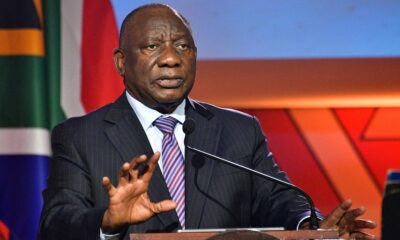Business
Pepi Silinga Out at Transnet Amid Disciplinary Storm

Controversial TNPA CEO exits “by mutual agreement” as probe rattles leadership
The winds of change have swept through Transnet once again, this time at the top of the country’s port authority. On July 16, the state-owned logistics giant confirmed that Pepi Silinga’s contract as CEO of the Transnet National Ports Authority (TNPA) has been terminated by “mutual agreement.”
Silinga, who took the helm in 2020 after leading the Coega Development Corporation, had been walking a tightrope since June this year when disciplinary proceedings were launched against him. At the centre of the storm? A forensic investigation into a tender at the Port of Ngqura, near Gqeberha.
The Tender That Sank the Ship
The Port of Ngqura tender had been raising eyebrows in industry circles for months. Although specific details of the investigation remain under wraps, sources close to the matter suggest irregularities that pointed to potential governance failures.
This follows mounting pressure on Transnet to clean house and restore confidence in its leadership, especially as the parastatal continues to reel from financial instability, service delivery challenges, and increased public scrutiny.
A Quiet Exit, But Loud Questions
In a terse statement, Transnet said it was committed to “a seamless transition” and confirmed that Advocate Phyllis Difeto will continue as acting CEO while the hunt for a permanent replacement begins.
The tone of the statement was calm, but the implications are anything but. For many in the logistics sector, Silinga’s exit signals deeper issues within TNPA’s executive culture, issues that go far beyond a single tender.
On social media, reactions were swift.
“How does a CEO exit during disciplinary action still get called ‘mutual’?” one user posted on X (formerly Twitter).
Another asked, “Is this really accountability or just damage control?”
Background: A Rocky Tenure
Silinga’s tenure was marked by ambition and controversy. Appointed during a period of sweeping leadership changes across state-owned entities, he was seen as a man on a mission to modernise ports and drive economic transformation.
But progress was often overshadowed by operational headaches and procurement woes. Critics say while he brought vision, he failed to maintain the trust needed to implement it fully.
Why It Matters
Ports are the lifeblood of South Africa’s trade. With TNPA overseeing eight commercial seaports, strong, transparent leadership is non-negotiable. Silinga’s exit, especially under a disciplinary cloud, raises concerns about who will steer the ship next and how quickly.
The news also arrives at a time when government is under growing pressure to professionalise state entities and tackle corruption. Silinga’s departure may be one step in that direction—but much more is needed.
All eyes are now on Transnet’s board and Public Enterprises Minister Pravin Gordhan. The question is whether the next TNPA CEO will bring more than just credentials to the table.
South Africans want action, transparency, and leaders who serve public interest over private deals. Whether this leadership change delivers that remains to be seen.
Pepi Silinga may be gone, but the issues he leaves behind are not. If Transnet wants to fix South Africa’s broken freight logistics system, it needs to look deeper than “mutual agreements.” It needs leadership South Africans can trust.
{Source: Engineering News}
Follow Joburg ETC on Facebook, Twitter , TikTok and Instagram
For more News in Johannesburg, visit joburgetc.com


























